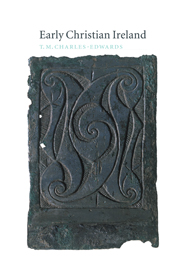Book contents
- Frontmatter
- Contents
- List of maps
- List of tables
- List of figures
- Acknowledgements
- Abbreviations
- A note on pronunciation
- A note on the Chronicle of Ireland
- Introduction
- 1 Ireland in the seventh century: a tour
- 2 Irish society c. 700: I. Communities
- 3 Irish society c. 700: II Social distinctions and moral values
- 4 Ireland and Rome
- 5 Conversion to Christianity
- 6 The organisation of the early Irish Church
- 7 Columba, Iona and Lindisfarne
- 8 Columbanus and his disciples
- 9 The Paschal controversy
- 10 The primatial claims of Armagh, Kildare and Canterbury
- 11 The origins and rise of the Uí Néill
- 12 The kingship of Tara
- 13 The powers of kings
- 14 Conclusion
- Appendix: genealogies and king-lists
- Glossary: Irish and Latin
- Bibliography
- Index
10 - The primatial claims of Armagh, Kildare and Canterbury
Published online by Cambridge University Press: 11 September 2009
- Frontmatter
- Contents
- List of maps
- List of tables
- List of figures
- Acknowledgements
- Abbreviations
- A note on pronunciation
- A note on the Chronicle of Ireland
- Introduction
- 1 Ireland in the seventh century: a tour
- 2 Irish society c. 700: I. Communities
- 3 Irish society c. 700: II Social distinctions and moral values
- 4 Ireland and Rome
- 5 Conversion to Christianity
- 6 The organisation of the early Irish Church
- 7 Columba, Iona and Lindisfarne
- 8 Columbanus and his disciples
- 9 The Paschal controversy
- 10 The primatial claims of Armagh, Kildare and Canterbury
- 11 The origins and rise of the Uí Néill
- 12 The kingship of Tara
- 13 The powers of kings
- 14 Conclusion
- Appendix: genealogies and king-lists
- Glossary: Irish and Latin
- Bibliography
- Index
Summary
In his Life of Brigit, written approximately in the third quarter of the seventh century, Cogitosus claimed that Kildare was an archiepiscopal see with an authority over other Irish bishops; in the Book of the Angel the same claim was made on behalf of Armagh. These claims raise fundamental questions about the organisation of the Irish Church at the highest level, in that they imply that one church could claim an authority over the whole of Ireland. The problems, however, are not confined to Ireland. In Stephen's Life of Wilfrid we are told that, at a papal synod held in 680, Wilfrid ‘confessed the true and catholic faith for all the northern part of Britain and Ireland, and for the islands which were settled by the peoples of the English and the Britons and also of the Irish and the Picts’. As bishop of York, he had exercised authority over much of the northern half of Britain; what is striking is that he asserted his right to speak for northern Ireland as well. This claim ran counter to those advanced by both Kildare and Armagh. If the bishop of York had the authority to give a solemn profession of faith on behalf not only of Dál Ríata (which included Iona, and over which kings of Northumbria were said by Bede to have exercised authority), but also over part of the mainland of Ireland, neither Kildare nor Armagh could enjoy a primacy throughout Ireland.
- Type
- Chapter
- Information
- Early Christian Ireland , pp. 416 - 440Publisher: Cambridge University PressPrint publication year: 2000
- 1
- Cited by



